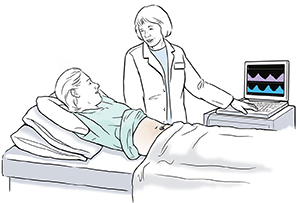Treating Interstitial Cystitis: Special Therapies and Surgery
Interstitial cystitis is a painful bladder condition. Experts don't know what causes it. But it may be linked to an allergy, autoimmune condition, injury, an infection (this is often hard to find), or a problem with the bladder wall. Certain treatments may help manage interstitial cystitis and ease pain. Some people find these treatments work well. But others don’t find them useful. Medicines can help ease symptoms for some people. You and your healthcare provider can discuss what’s best for you.
Biofeedback
Biofeedback is a painless treatment. It uses sensors and a computer screen. The sensors are placed on your belly (abdomen). The sensors read signals given off by your muscles. These signals are turned into lines on a computer screen. When you move your bladder muscles, you can see changes in the lines. Several sessions of biofeedback may help you better control your bladder muscles. This may help reduce your symptoms.

Electrical stimulation
This treatment sends electricity into the area around your bladder. It may help ease symptoms by blocking the nerve sensations to and from the bladder. It may also improve blood flow and strengthen the pelvic muscles. During the therapy, wires are placed on the skin of the low back or abdomen. Mild electric pulses are then sent into the body. This is done for several minutes to a few hours. The therapy may be repeated 1 or more times daily. This may continue for several weeks or months. This treatment is sometimes called TENS.
Other types of treatments
Therapeutic massage of the abdominal and pelvic muscles using heat or ice may help give you relief. Acupuncture, the therapeutic use of needles, has helped ease pain in some cases.
Surgery
Surgery may be advised for severe cases that aren't helped by any other treatment. Surgery isn't always useful. If your healthcare provider advises surgery, they can discuss the risks and benefits with you.
Online Medical Reviewer:
Chris Southard RN
Online Medical Reviewer:
Melinda Murray Ratini DO
Online Medical Reviewer:
Rita Sather RN
Date Last Reviewed:
3/1/2024
© 2000-2025 The StayWell Company, LLC. All rights reserved. This information is not intended as a substitute for professional medical care. Always follow your healthcare professional's instructions.